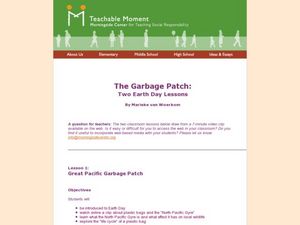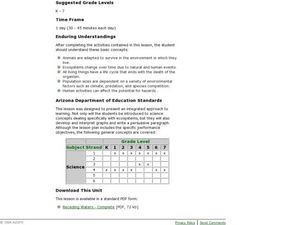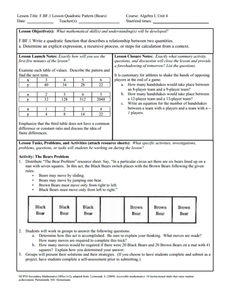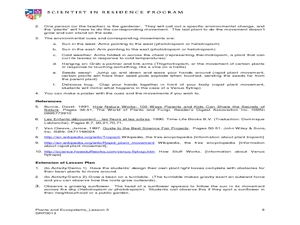Curated OER
The Garbage Patch: Two Earth day Lessons
Students view a seven minute video called Gorilla in the Greenhouse. In this Earth day activity, students review the history of Earth day. Students work in groups to describe the life cycle of a plastic bag. Students understand that...
Curated OER
Receding Waters
Students explore the effect of environmental factors on ecosystems. In this wildlife and ecology lesson, students identify and describe the stages in a frog's life cycle. Students participate in a simulation demonstrating the impact of...
Curated OER
Friends on the Farm
Young farmers explore the world of farm animals. They are introduced to a variety of animals, what their role is, how many legs they have, and what sounds they make. Worksheets and websites embedded in the plan are used to carry it out....
Prince William Network
The Incredible Journey
Divide your school gym into breeding grounds and non-breeding grounds so that your zoologists can play a game simulating the seasonal migration of shorebirds. Players pick one of the included game cards and follow its directions, which...
Curated OER
Butterfly Lifecycles
What a great way to present this topic! While a little difficult to follow, this lesson plan provides great ideas for a second grade lesson plan involving butterfly lifecycles. Learners make drawings of butterflies, discuss life cycles,...
Wild BC
Carbon - The Short and the Long
For this complex game about the carbon cycle, the playing field is divided into air, living, and earth zones. Children are assigned to be either plants or animals, and collect carbon tokens as they proceed from zone to zone. While the...
Curated OER
Life Processes
Students investigate the basic needs of organisms that must be met in order to carry out life processes. They view a variety of organism that are meeting and competing for resources. Students create an Idea Web for the animals shown....
Curated OER
The Great Horned Owl
In this recognizing facts about the Great Horned Owl worksheet, students read fun facts, match illustrations with adaptations, sequence life cycle cards, and read what to do if they find an injured bird. Students solve 16 answers.
National Wildlife Federation
Penguin Fun Facts
What's black and white and can dive up to 1,800 feet under water? That's right, penguins! Learn this and many other amazing facts about these unique birds with this handy reference sheet.
Curated OER
The Dragonflies of Summer
The best thing about dragonflies is that they make great topics for informational texts. Get those readers excited with a fun and interesting insect-related text passage that can help them increase their comprehension skills. As children...
Curated OER
Go Bug!
Second graders explore the lives of insects by participating in a card game. In this metamorphosis instructional activity, 2nd graders define several scientific vocabulary terms associated with insects and identify the different life...
Curated OER
The Circle of Life
Fourth graders examine how the different organisms living in an ecosystem affect one another. In groups, they research a specific ecosystem and present their findings to the class based on the type of organisms found in it. To end the...
Curated OER
Fungi
Why did the mushroom go to the party? Because he was a fun guy! Biology learners study fungi while completing this worksheet. Structure is compared to that of other life forms. The life cycle is displayed with colorful diagrams for...
Curated OER
Bears
Young scholars complete a variety of bear-related activities. They sort and graph teddy bears, distinguish between real and non-real bears and research bear life cycles and habitats.
Curated OER
What Do You Know About Horseshoe Crabs?
High schoolers create a learning tool based on information given on the assigned website. In this ocean life lesson, students read about the horseshoe crab and develop a worksheet, scavenger hunt, board game or any tool to aid learning....
BioEd Online
Butterflies in Space
How does gravity affect the life cycle of a butterfly? Learn first-hand what types of investigations astronauts perform in space by following along with one of NASA's experiments. Create butterfly habitats in the classroom with specific...
Curated OER
Hawaii's Freshwater Animals - Species Report
Learners explore biology by creating a report for the class. In this oceanography lesson, students research and identify the survival characteristics of a list of freshwater animals by utilizing the Internet and library. Learners...
Curated OER
Plants Alive! How Plants Grow and Move
Students explore how plants move in response to the environment. In this plant activity, students engage in three different experiments to investigate how plants grow and move. Resources available in English and French.
Curated OER
Agriculture is a Cycle
What do a bicycle and the life cycle have in common? Cover this and more with the series of cross-curricular activities included in this plan. Learners do everything from making bracelets that represent the life cycle to checking out the...
Curated OER
What is an Animal?
In this animal worksheet, students review characteristics of animals including body symmetry, development, and skeletal structure. This worksheet has 3 short answer questions.
Curated OER
Critters in Your Own Backyard
Pupils identify various animals and their habitats, as well as their specific traits In this animal habitat lesson, students list animals they've seen in their backyard. Pupils select one animal and do research. Students then answer 9...
Curated OER
Rosa Parks Community Garden
Students explore gardening and nutrition in the Rosa Parks Community Garden. They work in stations to discuss food choices, the life cycles of plants, and mini-composting. After starting in one station, they rotate to try each activity.
Curated OER
Web of Life - Ecosystem
Third graders play the roles of various organisms in an ecosystem (focusing on insects) and pass yarn or string around to other organisms from largest animals to the smallest. The end product is a web which shows how all of these animals...
Alabama Learning Exchange
Make a Difference!
We are very dependent upon other life forms around us to survive. Here, scholars explore relationships in the ecosystem with the help of Auntie Litter and the pollution patrol. They imagine a world without grass, making connections to...

























